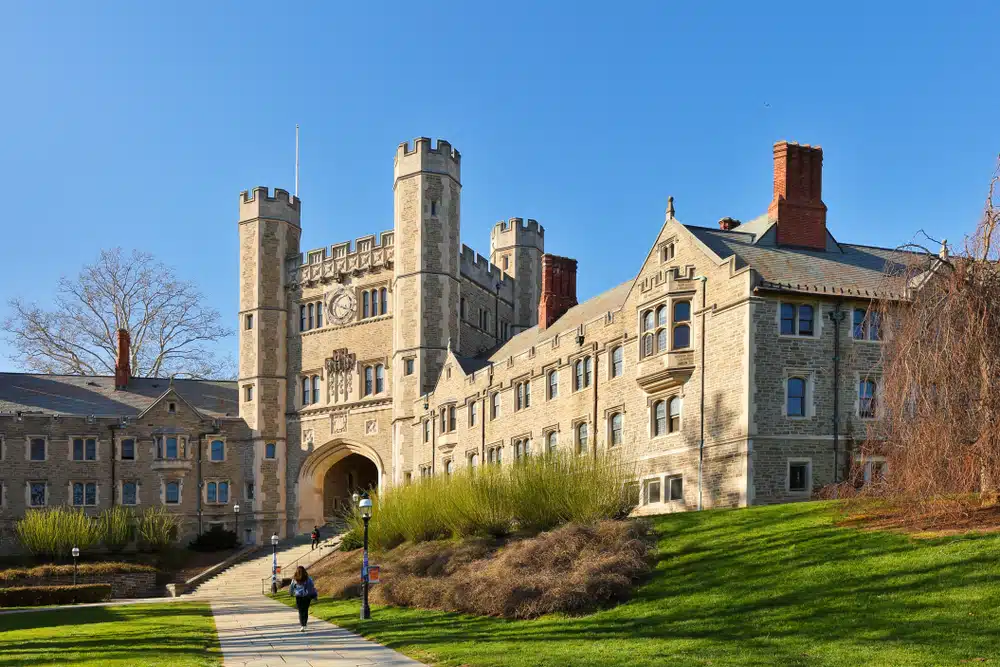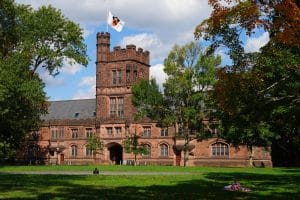The Princeton Curriculum
Princeton University, one of the world’s topmost institutions, is known for its versatile and comprehensive curriculum. Studying at Princeton not only ensures a deep understanding of your chosen discipline but also broad knowledge across various fields. The curriculum has been carefully designed to encourage critical thinking, interdisciplinary learning, and passionate investigation into the subjects that intrigue you the most.
Understanding the Academic Structure
The academic structure at Princeton is organized to promote well-rounded learning throughout your time at the university. It’s divided into several stages, each with its unique purpose and goal for the students’ academic enrichment.
When students first arrive at Princeton, they embark on a journey of intellectual exploration. The university believes in providing a strong foundation for all students, regardless of their intended major. The first two years of the academic structure are designed to expose students to a wide array of disciplines. This exposure allows students to develop a broad understanding of various subjects and helps them make informed decisions about their future areas of specialization.
During these initial years, students have the opportunity to take courses in fields they may have never considered before. They can delve into the realms of philosophy, literature, history, mathematics, and more. This exposure to diverse subjects not only expands their knowledge but also broadens their perspectives, enabling them to think critically and analytically.
Princeton Curriculum: The Four-Year Plan
All undergraduate students are ideally expected to follow a four-year plan. The first two years provide a broad foundation, exposing students to a wide array of disciplines. The last two years are dedicated to specialization in your chosen major. This structure ensures that students gain both depth and breadth in their education.
As students progress through their academic journey, they begin to focus more on their chosen major. The last two years of the four-year plan are dedicated to delving deeper into the subjects that captivate their intellectual curiosity. This specialization allows students to develop expertise in their chosen field, preparing them for future careers or further academic pursuits.
During these final years, students have the opportunity to work closely with professors who are renowned experts in their respective fields. They engage in advanced coursework, conduct research, and participate in seminars that foster intellectual discussions and collaborations. This immersive experience not only enhances their understanding of the subject matter but also hones their critical thinking and problem-solving skills.
Core Requirements for All Students
Regardless of their major, all Princeton students must fulfill certain core requirements to cultivate a wide-ranging academic perspective. These include writing, foreign language, quantitative reasoning, and distribution requirements. The latter ensures students take courses in a diversity of subjects, from arts and humanities to natural sciences and social sciences.
Writing courses are an integral part of the core requirements at Princeton. They aim to develop students’ communication skills and their ability to express complex ideas effectively. These courses provide a platform for students to refine their writing style and engage in critical analysis of various texts.
Foreign language courses, on the other hand, encourage students to explore different cultures and broaden their horizons. Learning a new language not only enables students to communicate with people from different backgrounds but also enhances their understanding of diverse perspectives and traditions.
Quantitative reasoning courses equip students with the necessary skills to analyze and interpret data. In an increasingly data-driven world, these skills are essential for making informed decisions and solving complex problems. By mastering quantitative reasoning, students develop a valuable toolkit that can be applied across various disciplines.
Elective Courses and Flexibility: The Princeton Curriculum
In addition to core requirements and major-related courses, students also have the flexibility to choose from an extensive assortment of elective courses. These electives offer opportunities to explore interests outside one’s major, allowing for an interdisciplinary and rounded education.
Elective courses at Princeton cover a wide range of subjects, from art history to computer science, from psychology to environmental studies. Students can tailor their academic journey to align with their passions and intellectual curiosity. They have the freedom to explore different fields, experiment with new ideas, and discover unexpected connections between seemingly unrelated disciplines.
Through elective courses, students can also engage in experiential learning opportunities such as internships, research projects, and study abroad programs. These experiences provide real-world applications of classroom knowledge and allow students to develop practical skills that complement their academic pursuits.
Overall, the academic structure at Princeton is designed to foster intellectual growth, critical thinking, and a lifelong love for learning. It encourages students to embrace the pursuit of knowledge, explore diverse subjects, and develop a well-rounded understanding of the world. Through a combination of core requirements, major-related courses, and elective options, Princeton offers a comprehensive educational experience that prepares students for success in their chosen fields and beyond.
Humanities in the Princeton Curriculum
Welcome to the fascinating world of the humanities! Let’s take a deep dive into the various academic divisions that make up this diverse and enriching field.
Overview of Humanities Departments
Princeton University is home to a wide range of humanities departments, each dedicated to exploring and understanding different aspects of human culture and expression. From literature to philosophy, religion to history, these departments offer a comprehensive and interdisciplinary approach to studying the human experience.
Within these departments, you will find renowned faculty members who are not only experts in their respective fields but also passionate educators committed to nurturing the intellectual growth of their students. Their dedication to scholarship and teaching creates a vibrant community of scholars where critical inquiry and intellectual rigor thrive.
Unique Features of Humanities at Princeton
What sets the humanities program at Princeton apart is its emphasis on interdisciplinary study. Recognizing that knowledge is not confined to a single discipline, the curriculum encourages students to explore connections between different domains of knowledge. This interdisciplinary approach allows for a deeper understanding of complex issues and fosters creative and innovative thinking.
Furthermore, Princeton University provides a plethora of opportunities for original research, even at the undergraduate level. Students have the chance to engage in their own independent research projects, working closely with faculty mentors who guide and support their intellectual pursuits. This hands-on experience not only enhances their academic growth but also prepares them for future endeavors in research and scholarship.
Interdisciplinary Opportunities in Humanities
The Princeton curriculum goes beyond traditional disciplinary boundaries by offering numerous interdisciplinary programs that blend the humanities with other fields of study. These programs, such as the “Humanities Council” and the “Program in Humanistic Studies,” provide students with the unique opportunity to combine diverse interests and explore the intersections between different disciplines.
By participating in these interdisciplinary programs, students can delve into topics that transcend traditional academic boundaries. They can explore how literature intersects with philosophy or how history informs religious studies. This interdisciplinary approach not only broadens their intellectual horizons but also equips them with the skills to tackle complex problems from multiple perspectives.
So, if you are passionate about understanding the human experience, exploring diverse cultures, and engaging in critical analysis, the humanities program at Princeton University offers an enriching and transformative educational journey. Join us as we embark on a quest to unravel the complexities of human existence and shape the world through the power of knowledge.
Sciences in the Princeton Curriculum
Moving on to the sciences—another area in which Princeton excels.
Princeton University is renowned for its exceptional science departments, which cover a broad range of disciplines from physics to ecology. These departments offer both bachelor’s and advanced degrees, providing students with a comprehensive education in their chosen field. The curriculum is carefully designed to nurture scientific thinking and encourage students to apply their knowledge to real-world problems.
One of the key strengths of Princeton’s science programs is the abundance of research opportunities available to students. The university not only values theoretical knowledge but also places heavy emphasis on practical exposure. Students have the chance to join research projects and work closely with esteemed faculty members in cutting-edge laboratories. This hands-on experience allows students to delve deeper into their chosen field, gain valuable insights, and contribute to the advancement of scientific knowledge.
Laboratory work is an integral part of scientific education at Princeton. The university recognizes the importance of practical application and provides state-of-the-art laboratory facilities for students to conduct experiments and explore scientific concepts. Engaging in laboratory work not only enriches classroom learning but also equips students with essential hands-on experience. Through conducting experiments, analyzing data, and troubleshooting, students develop critical thinking and analytical skills that are crucial for success in the scientific field.
Collaborative Learning and Mentorship
The Princeton Curriculum fosters a culture of collaboration and mentorship within its science departments. Students have the opportunity to work closely with faculty members who are experts in their respective fields. This mentorship relationship allows students to receive personalized guidance, advice, and support, ensuring their academic and professional growth.
Furthermore, Princeton encourages collaborative learning among students. Through group projects, discussions, and research teams, students learn to work effectively in teams, exchange ideas, and solve complex scientific problems together. This collaborative approach not only enhances the learning experience but also prepares students for the collaborative nature of scientific research and innovation.
Interdisciplinary Approach to Science
Princeton University recognizes that many of the most pressing scientific challenges require an interdisciplinary approach. Therefore, the university encourages students to explore connections between different scientific disciplines and offers interdisciplinary programs and courses. This interdisciplinary approach fosters a holistic understanding of complex scientific problems and equips students with the skills to tackle these challenges from multiple angles.
Overall, Princeton University’s science departments provide students with a comprehensive and enriching education in the sciences. Through a combination of rigorous coursework, hands-on laboratory experience, research opportunities, collaborative learning, and interdisciplinary approaches, students are well-prepared to make significant contributions to the scientific community and address the world’s most pressing challenges.
Social Sciences in the Princeton Curriculum
Lastly, let’s delve into the social sciences, where Princeton offers a multitude of engaging courses.
When it comes to the social sciences, Princeton University is at the forefront of providing a comprehensive education that explores the complexities of human society and behavior. With a wide spectrum of disciplines, including economics, politics, psychology, and sociology, students have the opportunity to gain a deep understanding of how individuals and communities interact with the world.
Social Science Disciplines
Princeton’s social science disciplines cover a broad range of topics, allowing students to explore various aspects of human society. In economics, students learn about the principles of supply and demand, market structures, and the impact of economic policies. The politics program delves into the intricacies of government systems, international relations, and political ideologies. Psychology courses focus on understanding human behavior, cognition, and the factors that influence our thoughts and actions. Sociology, on the other hand, examines social structures, institutions, and the dynamics of groups and communities.
By offering such diverse disciplines, Princeton ensures that students have the opportunity to explore their interests and develop a well-rounded understanding of the social sciences.
Theoretical and Practical Learning in Social Sciences
At Princeton, the study of social sciences goes beyond theoretical knowledge. Classes are designed to incorporate practical learning experiences, allowing students to apply their knowledge to real-world issues and situations. Through case studies, research projects, and interactive discussions, students gain a deeper understanding of social dynamics and develop critical thinking skills.
For example, in an economics class, students may analyze real-world economic data to understand the impact of government policies on income inequality. In a political science course, students might engage in simulations of international negotiations to explore the complexities of diplomacy. Psychology students may conduct experiments to study human behavior in different social contexts, while sociology students may conduct fieldwork to examine the dynamics of a particular community.
This emphasis on practical learning not only enhances students’ understanding of the social sciences but also equips them with the skills necessary to make insightful contributions to society post-graduation.
Career Prospects after Studying Social Sciences
Graduates from Princeton’s social sciences programs have a wide range of career prospects available to them. The valuable skills and knowledge gained in these courses prepare students well for the evolving career landscape.
Many social science graduates go on to pursue careers in academia, conducting research and teaching at universities and colleges around the world. Others find employment in government agencies, where their understanding of political systems and policies is highly valued. Non-profit organizations also offer opportunities for social science graduates to make a positive impact on society, working in areas such as community development, social justice, and public policy.
Furthermore, the analytical and critical thinking skills developed through the study of social sciences are highly sought after in various industries, including consulting, market research, and data analysis. The ability to understand and interpret complex social dynamics is invaluable in today’s interconnected world.
Whether you are delving into the nuances of human culture, probing the mysteries of the natural world, or unraveling the complexities of social dynamics, Princeton’s curriculum offers a comprehensive education, fostering an environment of curiosity, exploration, and intellectual growth.
By studying the social sciences at Princeton, students not only gain a deep understanding of human society and behavior but also develop the skills and knowledge necessary to make a meaningful impact in their chosen careers and contribute to the betterment of society as a whole.
How AdmissionSight Can Help You With College Admissions
AdmissionSight is a college consulting firm that provides personalized assistance to students throughout the college admissions process. Here are some ways that AdmissionSight can help you:
Admissions strategy: AdmissionSight can help you develop a strategic plan for your college application process. Our professional consultants can assist with identifying schools that are a good fit for your academic, extracurricular, and personal goals and help you plan and prioritize your application strategy.
Application review: AdmissionSight can review your application and provide feedback on how to improve it. We can offer suggestions on making your application stand out and highlighting your strengths and unique qualities.
Essay coaching: AdmissionSight can help you craft compelling essays that showcase your personality, goals, and achievements. We can guide you through the essay writing process and provide feedback on your drafts to help you refine your writing.
Interview preparation: AdmissionSight can provide interview coaching to help you feel confident and prepared for college interviews. Our experts can offer tips on how to present yourself professionally and how to answer common interview questions.
Extracurricular planning: AdmissionSight can help you plan and develop your extracurricular activities to make them more impactful and meaningful. We can suggest activities that align with your interests and goals and provide guidance on demonstrating your leadership and initiative.
Overall, AdmissionSight can provide valuable guidance and support throughout the college admissions process to help you maximize your chances of getting accepted into the college of your choice.
With a high success rate of over 75%, we have built a strong network in the past decade. Book an initial consultation today, free of charge!










































